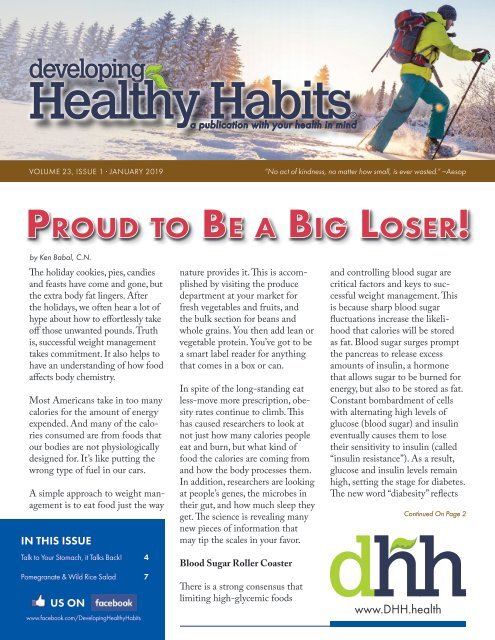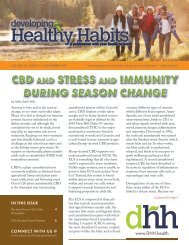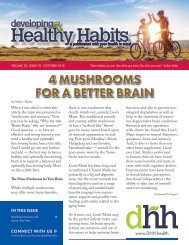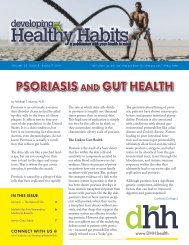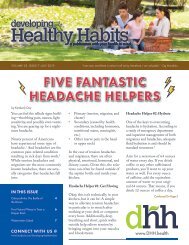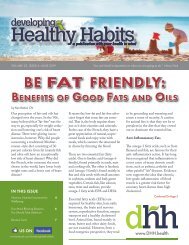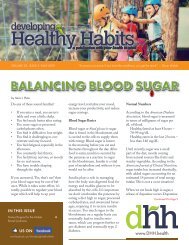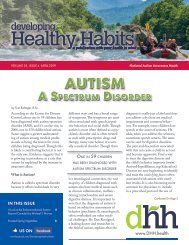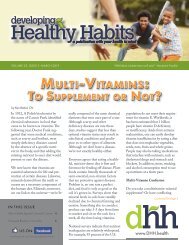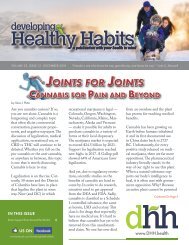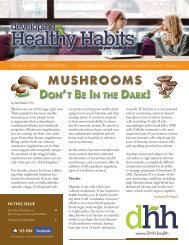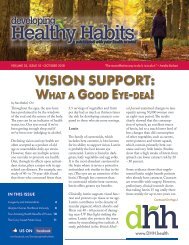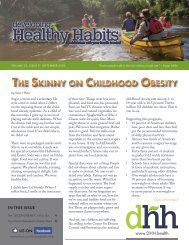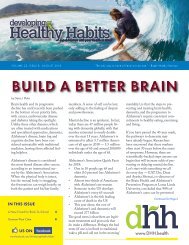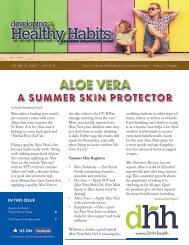January 2019
You also want an ePaper? Increase the reach of your titles
YUMPU automatically turns print PDFs into web optimized ePapers that Google loves.
VOLUME 23, ISSUE 1 · JANUARY <strong>2019</strong><br />
“No act of kindness, no matter how small, is ever wasted.” ~Aesop<br />
Proud to Be a Big Loser!<br />
by Ken Babal, C.N.<br />
The holiday cookies, pies, candies<br />
and feasts have come and gone, but<br />
the extra body fat lingers. After<br />
the holidays, we often hear a lot of<br />
hype about how to effortlessly take<br />
off those unwanted pounds. Truth<br />
is, successful weight management<br />
takes commitment. It also helps to<br />
have an understanding of how food<br />
affects body chemistry.<br />
Most Americans take in too many<br />
calories for the amount of energy<br />
expended. And many of the calories<br />
consumed are from foods that<br />
our bodies are not physiologically<br />
designed for. It’s like putting the<br />
wrong type of fuel in our cars.<br />
A simple approach to weight management<br />
is to eat food just the way<br />
IN THIS ISSUE<br />
Talk to Your Stomach, it Talks Back!<br />
Pomegranate & Wild Rice Salad<br />
US ON<br />
www.facebook.com/DevelopingHealthyHabits<br />
4<br />
7<br />
nature provides it. This is accomplished<br />
by visiting the produce<br />
department at your market for<br />
fresh vegetables and fruits, and<br />
the bulk section for beans and<br />
whole grains. You then add lean or<br />
vegetable protein. You’ve got to be<br />
a smart label reader for anything<br />
that comes in a box or can.<br />
In spite of the long-standing eat<br />
less-move more prescription, obesity<br />
rates continue to climb. This<br />
has caused researchers to look at<br />
not just how many calories people<br />
eat and burn, but what kind of<br />
food the calories are coming from<br />
and how the body processes them.<br />
In addition, researchers are looking<br />
at people’s genes, the microbes in<br />
their gut, and how much sleep they<br />
get. The science is revealing many<br />
new pieces of information that<br />
may tip the scales in your favor.<br />
Blood Sugar Roller Coaster<br />
There is a strong consensus that<br />
limiting high-glycemic foods<br />
and controlling blood sugar are<br />
critical factors and keys to successful<br />
weight management. This<br />
is because sharp blood sugar<br />
fluctuations increase the likelihood<br />
that calories will be stored<br />
as fat. Blood sugar surges prompt<br />
the pancreas to release excess<br />
amounts of insulin, a hormone<br />
that allows sugar to be burned for<br />
energy, but also to be stored as fat.<br />
Constant bombardment of cells<br />
with alternating high levels of<br />
glucose (blood sugar) and insulin<br />
eventually causes them to lose<br />
their sensitivity to insulin (called<br />
“insulin resistance”). As a result,<br />
glucose and insulin levels remain<br />
high, setting the stage for diabetes.<br />
The new word “diabesity” reflects<br />
Continued On Page 2<br />
www.DHH.health
PROUD TO BE A BIG LOSER! — Continued from Page 1<br />
Developing Healthy Habits<br />
Published by:<br />
Developing Healthy Habits, LLC.<br />
3275 S. John Young Parkway, Suite 152<br />
Kissimmee, FL 34746<br />
1-800-713-2802<br />
www.DHH.health<br />
Executive Editor<br />
Mark A. Carroll<br />
Managing Editor<br />
Sandra Michalski<br />
Associate Editor<br />
Nicholas A. Carroll<br />
Design<br />
NXS Designs<br />
JAM Graphics Design<br />
Contributors<br />
Ken Babal<br />
Natasha Trenev<br />
To subscribe visit:<br />
www.DHH.health<br />
For content contribution contact:<br />
Sandra@DevelopingHealthyHabits.com<br />
For advertising inquires contact:<br />
Nick@DevelopingHealthyHabits.com<br />
Mission Statement:<br />
“Our mission is to continually provide<br />
a well written and clearly presented<br />
newsletter that is devoted to<br />
empowering individuals<br />
to make educated decisions relating to<br />
their health and wellness.”<br />
the tendency for diabetes to be<br />
accompanied by obesity.<br />
Certain foods stand out for their<br />
ability to favorably affect glucose<br />
and insulin levels, such as cinnamon,<br />
oats, bitter melon and<br />
maitake mushroom. Maitake<br />
excels in treating what I call<br />
“conditions of excess,” whether<br />
it is excess blood pressure, blood<br />
sugar, body weight, cholesterol<br />
or triglycerides. The mushroom<br />
is the source of a glycoprotein<br />
extract (SX-fraction) that has<br />
been found to enhance insulin<br />
sensitivity. In experiments<br />
at Georgetown University, the<br />
compound reduced levels of<br />
fasting glucose, blood pressure<br />
and body weight in genetically<br />
obese and diabetic rats. A clinical<br />
study found that Type 2 diabetics<br />
taking the extract were able to<br />
significantly reduce their fasting<br />
blood glucose, triglycerides,<br />
insulin and body weight.<br />
Weight-Loss Supplements<br />
Although there are no magic pills,<br />
certain dietary supplements can<br />
enhance the results of a weightloss<br />
program. The best product<br />
for you depends on your particular<br />
needs. For example, is your<br />
metabolism slow? Is your appetite<br />
excessive? Do you have food<br />
allergies? Do you have a high<br />
stress level? Do you have symptoms<br />
of insulin resistance? Each<br />
of these factors contributes to<br />
unhealthy weight gain and can be<br />
addressed with diet modifications<br />
and specific nutritional or herbal<br />
remedies. Nothing is 100 percent<br />
successful in every person.<br />
But if you are eating healthy and<br />
exercising, the right product can<br />
improve your results.<br />
Appetite suppressants - Hoodia,<br />
Garcinia cambogia (hydroxycitric<br />
acid), Caralluma, conjugated<br />
linoleic acid (CLA)<br />
Carb blockers – bean pod (Phaseolus<br />
vulgaris)<br />
Fat blocker – chitin<br />
Thermogenic agents (create heat,<br />
calorie-burning) - fucoxanthin,<br />
7-keto DHEA, green tea, ginger,<br />
cayenne, coconut oil, fish oil<br />
Glucose regulators - fibers such as<br />
psyllium, glucomannan, guar and<br />
oat bran, green coffee bean extract,<br />
chromium, maitake SX-fraction<br />
Keys to Successful Fat-Loss<br />
1. Divide daily calories into<br />
three meals plus one or two<br />
snacks per day. Keep meals<br />
within 300-500 calories;<br />
snacks 100-200 calories.<br />
Never go more than four or<br />
five hours without eating. Eat<br />
just enough to sustain you to<br />
your next meal—no more, no<br />
less.<br />
Continued On Page 3<br />
The statements and products in this newsletter<br />
have not been evaluated by the Food and Drug<br />
Administration and are not intended to diagnose,<br />
treat, cure or prevent any disease.<br />
2 <strong>January</strong> <strong>2019</strong> • www.DHH.health
PROUD TO BE A BIG LOSER! — Continued from Page 2<br />
2. Have some protein at each<br />
meal. Protein selections are<br />
meat, poultry (about what can<br />
fit in the palm of your hand<br />
and no higher), fish, tofu, eggs,<br />
cottage cheese, soy burgers or<br />
protein shakes.<br />
3. Include some essential fats<br />
with each meal. For example,<br />
a few olives, nuts or seeds,<br />
¼ avocado, salad dressing (1<br />
tablespoon) or olive or flaxseed<br />
oil (1 teaspoon).<br />
4. Fill half of your plate with<br />
vegetables and fruits.<br />
5. Avoid sugars and refined carbs<br />
(cookies, pies, cakes, candy,<br />
pastries, soda pop and sugary<br />
cereals). Every successful diet<br />
in history has restricted sugar.<br />
If you crave sugar, it’s usually<br />
because you’ve gone too long<br />
without eating a meal, or didn’t<br />
get the protein serving right<br />
(too little or too much).<br />
6. Don’t eat a large meal within<br />
three hours of bedtime. A small,<br />
bedtime snack is ok if hungry.<br />
7. Drink 8-12 ounces of water<br />
in the morning and between<br />
meals to flush waste products<br />
from your system. Don’t use<br />
fruit juices and sodas to satisfy<br />
your thirst.<br />
8. Include fat-metabolizing<br />
foods, herbs and spices such<br />
as sea greens, green tea, fresh<br />
fruits and salads, spirulina, ginger,<br />
lemon juice and stevia.<br />
9. Take a multiple vitamin-mineral<br />
supplement and probiotic.<br />
A multi may prevent possible<br />
deficiencies on a reduced<br />
calorie diet; probiotic bacteria<br />
secrete short-chain fatty acids<br />
that may cause less fat to accumulate,<br />
boost calorie-burning<br />
and increase satiety.<br />
10. Become more active. Find an<br />
activity that is enjoyable to<br />
burn calories and tune up your<br />
metabolism, such as walking,<br />
running, bicycling, dancing or<br />
gym work-outs.<br />
Author’s Bio:<br />
Ken Babal has a<br />
clinical nutrition<br />
practice in Los<br />
Angeles and is the<br />
author of numerous<br />
books, including<br />
Seafood Sense: The Truth about Seafood<br />
Nutrition and Safety (Basic Health 2005)<br />
and Mushrooms for Health and Longevity<br />
(Books Alive 2011). His forthcoming<br />
book is The Yin-Yang Diet for Balanced<br />
Nutrition, Health and Harmony (Turner<br />
Publishing <strong>2019</strong>). Visit his website at<br />
www.NutritionMusician.com<br />
BETTER RESULTS THAN CBD…<br />
GUARANTEED *<br />
BEYOND CBD<br />
Doctor Formulated<br />
Full Spectrum<br />
Phytocannabinoid Support<br />
Safely non-Cannabis<br />
Drug test compliant<br />
More comprehensive than<br />
CBD alone<br />
Legal and Sustainable<br />
Our award winning, condition specific line offers advanced support for your Endocannabinoid<br />
System, BEYOND CBD. Each product is expertly formulated with our science-backed proprietary and<br />
non-cannabis PhytoCann ® Complex that offers more comphrehensive support than CBD.<br />
GUARANTEED TO BE MORE EFFECTIVE THAN CBD<br />
OR YOUR MONEY BACK<br />
Learn more about emeraldhealthbio.com or visit your local<br />
health food store today!<br />
18EH0036 Dophin Pub Half Page Ad.indd 1<br />
10/21/18 3:20 PM<br />
www.DHH.health • <strong>January</strong> <strong>2019</strong> 3
Talk to Your Stomach,<br />
it Talks Back!<br />
by Natasha Trenev<br />
Do the tiny bacteria that live in<br />
your gut influence what you eat?<br />
It’s a compelling question and one<br />
you probably haven’t considered.<br />
The microorganisms in your intestinal<br />
tract are more cunning than<br />
you might imagine. Can’t resist<br />
that chocolate covered donut?<br />
Maybe you can blame it on your<br />
gut bacteria.<br />
The bacteria that live in your gut<br />
are closely connected to your<br />
brain. So closely intertwined<br />
that gut bacteria may affect your<br />
mood and play a role in conditions<br />
such as anxiety and depression.<br />
Researchers have even discovered<br />
they can influence an animal’s personality,<br />
how outgoing or fearful it<br />
is, by “tweaking” the populations<br />
of bacteria in their intestinal tract.<br />
Your Brain and Gut Are<br />
Closely Connected<br />
Your brain and gut are connected by<br />
one of the most important nerves<br />
in the body, the vagus nerve, which<br />
carries input from the brain to the<br />
digestive tract to regulate digestive<br />
function. Scientists think communication<br />
between the brain and gut<br />
take place in other ways as well —<br />
through circulating immune cells<br />
and through metabolic by-products<br />
and chemicals produced by bacteria<br />
in the gut that travel to the brain.<br />
In fact, inside your intestinal tract<br />
lies a nervous system referred to<br />
as the “second brain.” This sophisticated<br />
collection of nerves affects<br />
how nutrients are handled, the<br />
secretion of gastric acid, and how<br />
quickly food makes its way from<br />
your mouth to the end of your<br />
intestinal tract.<br />
Interestingly, some of the same<br />
neurotransmitters made by your<br />
brain, chemicals that influence factors<br />
like your mood, sleep patterns<br />
etc., are also made by your digestive<br />
tract. For example, serotonin, a neurotransmitter<br />
that influences mood,<br />
sleep, digestion and sexual desire,<br />
is produced partially by your brain,<br />
but almost 90% is made in your<br />
digestive tract. So, your primary<br />
brain and “second brain” are closely<br />
connected — your brain influences<br />
your gut and your gut talks back to<br />
your brain. That’s why people who<br />
are anxious or depressed lose their<br />
appetite, experience “butterflies” in<br />
their stomach or develop heartburn<br />
or indigestion.<br />
With such a close alliance between<br />
the gut and brain and given that<br />
trillions of gut bacteria in the<br />
intestines influence digestive<br />
function and even your mood,<br />
you might wonder whether your<br />
microbiota influences your dietary<br />
choices.<br />
Gut Bacteria and Food Cravings<br />
The next time you have a craving<br />
for something decadent - can<br />
you blame it on your gut bacteria?<br />
Possibly. As discussed, your “second<br />
brain” is home to a variety of<br />
chemicals and neurotransmitters,<br />
some of which are produced by<br />
gut bacteria. Some of these chemicals,<br />
like dopamine, are directly<br />
involved in appetite and mood.<br />
Studies have shown that gut<br />
bacteria, removed from the intestinal<br />
tract, can produce dopamine,<br />
a neurotransmitter once thought<br />
to be restricted to the brain and<br />
central nervous system. Dopamine<br />
gives rise to feelings of reward,<br />
including the pleasurable feelings<br />
you get when you eat something<br />
delicious.<br />
There’s also evidence that gut<br />
bacteria can impact hormones that<br />
regulate appetite and those that<br />
affect satiety; how full you feel<br />
after a meal. These include peptide<br />
PYY, a hormone produced by the<br />
pancreas, that gives you the feeling<br />
of being full and satisfied after<br />
eating. Do gut bacteria actually<br />
influence the food choices you<br />
make and increase cravings for<br />
foods that best support their own<br />
growth and survival? After all,<br />
like other organisms, bacteria are<br />
Continued On Page 5<br />
4 <strong>January</strong> <strong>2019</strong> • www.DHH.health
ShotGlass2.375x4.75a_Layout 1 5/31/18 10:56 AM Pag<br />
TALK TO YOUR STOMACH — Continued from Page 4<br />
interested in their own self-preservation<br />
and survival and they need<br />
energy and certain nutrients to do<br />
that. Are bacteria cunning enough<br />
to trick your brain into eating<br />
what they need to prosper?<br />
Are Gut Bacteria in Control<br />
of Your Diet?<br />
Nutrients and energy sources that<br />
cause one species of bacteria to<br />
grow and thrive might not be ideal<br />
for another. So, how can bacteria<br />
get what they need? Possibly, by<br />
increasing cravings for foods that<br />
best serve their survival interests.<br />
Bacteria may have the capacity to<br />
do this by producing chemicals,<br />
like dopamine, that feed back on<br />
the brain and affect your appetite<br />
and the degree of pleasure<br />
and reward you feel when you eat<br />
a particular food. Gut bacteria<br />
could have more control over your<br />
appetite and food choices than you<br />
think.<br />
This is a hard area to study in<br />
humans, but research in mice<br />
supports the idea that gut bacteria<br />
influence food choices. What<br />
human research DOES show is<br />
obese and overweight people have<br />
a particular composition of gut<br />
bacteria that differs from that of<br />
lean and normal weight individuals.<br />
The question is, why? One possibility<br />
is the bacteria in the gut<br />
subtly manipulate food choices<br />
through a two-way connection<br />
between the gut and brain, leading<br />
the host to consume foods higher<br />
in fat or sugar. Some evidence suggests<br />
that bacteria can change the<br />
Continued On Page 6<br />
Healthier Skin & Body<br />
Look & Feel the<br />
Difference<br />
Herbal Bitter - 1st Step for<br />
Digestion, Energy &much more!<br />
• Works Fast & Delicious Flavors.<br />
• Troubled Skin Support<br />
• Gluten Free Cosmetics<br />
Since 1991 • Satisfaction Guaranteed!<br />
1-800-414-ALOE • www.aloelife.com<br />
www.DHH.health • <strong>January</strong> <strong>2019</strong> 5
TALK TO YOUR STOMACH — Continued from Page 5<br />
expression of receptors involved<br />
in taste, making some foods taste<br />
more or less appealing. It could be<br />
that when pathogenic organisms,<br />
like yeast, invade the intestinal<br />
tract and upset the balance, it leads<br />
to cravings for sugary foods, since<br />
yeast thrive on sugar.<br />
Another observation that supports<br />
the idea that bacteria<br />
influence dietary choices pertains<br />
to obese people who undergo<br />
gastric bypass surgery. These<br />
individuals often experience<br />
changes in taste receptors so that<br />
foods that were once appealing to<br />
them no longer are. In addition,<br />
gastric bypass surgery also leads<br />
to changes in the gut microbiota.<br />
Are the two linked and can they<br />
account for some of the benefits<br />
of gastric bypass surgery?<br />
Research also suggests that the<br />
diet can affect the type of bacteria<br />
that grow and thrive in our intestinal<br />
tracts. For example, when you<br />
compare kids who eat a low-fat,<br />
high-fiber diet to ones that eat a<br />
low-fiber diet, their gut microbiota<br />
differ.<br />
Changes in gut bacteria can<br />
happen quickly. Research shows<br />
switching the diet from low-fat to<br />
high sugar and fat leads to changes<br />
in the gut microbiota in as little as<br />
one day. It’s the old, chicken and<br />
egg question — do we select for<br />
the type of gut bacteria we have<br />
by what WE choose to eat or are<br />
the bacteria running the show by<br />
telling us what TO eat? It’s an<br />
intriguing question; to consider<br />
that such tiny organisms could<br />
have so much influence. With trillions<br />
of bacteria in the gut, there’s<br />
strength in numbers.<br />
If bacteria in the gut manipulate<br />
the food choices we make, cultivating<br />
a population of gut bacteria<br />
that increase the desire to eat<br />
healthy, whole foods that are lower<br />
in calories would be of benefit.<br />
We know the trillions of bacteria<br />
that live in the gut are influenced<br />
by nutritional factors and the diet<br />
we eat, but it may work both ways<br />
- bacteria may affect what we eat<br />
and how we ‘feed’ them. Hopefully,<br />
science will be able to determine<br />
whether bacteria have really<br />
involved the capacity to influence<br />
dietary choices and how this takes<br />
place. For now, the best approach<br />
is to foster an intestinal environment<br />
where “good” bacteria can<br />
thrive. Seed your gut with gutfriendly<br />
probiotic bacteria, and,<br />
just maybe, they’ll help you make<br />
smarter dietary choices.<br />
References:<br />
Live Science. “Can Microbes in the<br />
Gut Influence the Brain?”<br />
J Bacteriol. 2013 Feb; 195(3): 411-<br />
416.doi: 10.1128/JB.01384-12.<br />
American Psychological Association.<br />
“That Gut Feeling”<br />
Nutraingredients-USA.com. “Can<br />
Gut Microbes Affect Eating Behavior?<br />
It’s an Intriguing Field of<br />
Research, Expert Says” June 12, 2015.<br />
Medscape Family Medicine. “Is Your<br />
Gut Ruling Your Brain on Food<br />
Choices?”<br />
Science Translational Medicine 11 Nov<br />
2009: Vol. 1, Issue 6, pp. 6ra14. DOI:<br />
10.1126/scitranslmed.3000322.<br />
Author’s Bio:<br />
Natasha Trenev is<br />
the Founder and<br />
President of Natren,<br />
also known as the<br />
“Mother of Probiotics.”<br />
Natasha<br />
is a published researcher in the field of<br />
probiotics and author of several probiotic<br />
books. She’s a developmental scientist<br />
and authority on probiotics and probiotic<br />
function as it relates to human health.<br />
She has selflessly and tirelessly dedicated<br />
her life to researching, formulating and<br />
educating the public about the wonderful<br />
health benefits that probiotics can deliver<br />
to the human body.<br />
6 <strong>January</strong> <strong>2019</strong> • www.DHH.health
Recipe<br />
OF THE MONTH<br />
POMEGRANATE & WILD RICE SALAD<br />
Prep Time: 20 minutes — Cook Time: 30 minutes — Makes: 6 servings<br />
2-3 medium (~2 ½ cups) sweet<br />
potatoes, peeled and chopped<br />
1 ½ Tbsp. olive oil<br />
Freshly cracked pepper and salt<br />
1 package (4.3 ounces) Long Grain and<br />
Wild Rice Mix<br />
1 cup fresh pomegranate arils<br />
½ cup sliced almonds<br />
8-10 ounces mixed greens lettuce I use a<br />
50/50 blend spinach & spring mix leaves<br />
INGREDIENTS:<br />
Lemon Honey Dressing<br />
1 Tbsp. honey<br />
1 large lemon (2 Tbsps. juice, ¼ tsp. zest)<br />
¾ Tbsp. red wine vinegar<br />
2 Tbsps. olive oil<br />
½ tsp. Dijon mustard<br />
½ tsp. dried oregano<br />
Freshly cracked pepper and salt, to taste<br />
Optional<br />
2-4 ounces Crumbled goat cheese or feta<br />
DIRECTIONS:<br />
Preheat the oven to 400 degrees. Peel and chop the sweet potato into small chunks. Toss the<br />
potato chunks in olive oil and sprinkle generously with salt and pepper. Toss to coat.<br />
Bake for 10 minutes, flip and return to the oven for another 10 minutes, and then flip once<br />
more and bake for 10 more minutes or until the potato chunks are tender and roasted<br />
through. Don’t overcook the potatoes.<br />
Meanwhile, prepare the wild rice according to the package directions if you are using a<br />
package mix. If you make the homemade wild rice, start with making that before roasting<br />
the sweet potato so they will be done around the same time.<br />
Combine the roasted sweet potato with the cooked wild rice in a large bowl and place in<br />
the fridge while prepping the dressing.<br />
For the dressing, combine all of the ingredients in a mason jar or small bowl. Place the lid<br />
on the mason jar and shake (or whisk in the bowl) until combined. Taste and adjust (adding<br />
additional salt/pepper/honey, to taste)<br />
Add dressing to the cooled potato + wild rice mixture. Toss with the lettuce and add the<br />
pomegranate arils plus almonds. Toss everything with the dressing and add in some feta or<br />
crumbled goat cheese to personal preference. Increase the amounts of pomegranate arils or<br />
almonds, if desired.<br />
Enjoy the dressed salad the same day. If preparing the salad for the next day, store the salad<br />
separately from the dressing, almonds, and cheese.<br />
“Like” us at www.facebook.com/DevelopingHealthyHabits<br />
Also, check us out at www.DHH.health
Your optimal health.<br />
Our ultimate goal.<br />
Our best-selling formulas deliver essential<br />
omega-3s that every body needs.<br />
†<br />
nordicnaturals.com<br />
†Based on SPINS Scan Data


